译林牛津版八上英语 Unit 8 Natural disasters Reading II教案
最新牛津译林版中学八年级英语上册 Unit 8 Natural disasters教案
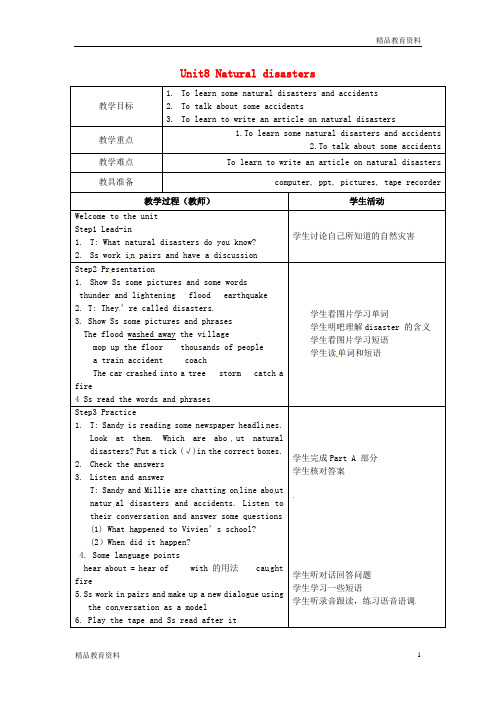
Unit8 Natural disasters教学目标1.To learn some natural disasters and accidents2.To talk about some accidents3.To learn to write an article on natural disasters教学重点1.To learn some natural disasters and accidents2.To talk about some accidents教学难点To learn to write an article on natural disasters 教具准备 computer, ppt, pictures, tape recorder 教学过程(教师)学生活动Welcome to the unitStep1 Lead-in1.T: What natural disasters do you know?2.Ss work i n pairs and have a discussion学生讨论自己所知道的自然灾害Step2 Pr esentation1.Show Ss some pictures and some wordsthunder and lightening flood earthquake2. T: They’re called disasters.3. Show Ss some pictures and phrasesThe flood washed away the vi llagemop up the floor thousands of peoplea train accident coachThe car crashed into a tree storm catch a fire4 Ss read the words and phrases 学生看图片学习单词学生明吧理解disaster 的含义学生看图片学习短语学生读单词和短语Step3 Practice1.T: Sandy is reading some newspaper headli nes.Look at them. Which are abo ut naturaldisasters? Put a tick (√)in the correct boxes.2.Check the answers3.Listen and answerT: Sandy and Millie are chatting on line abo ut natur al disasters and accidents. Listen to their conversation and answer some questions(1) What happened to Vivien’s school?(2)When did it happen?4. Some language pointshear about = hear of with 的用法 cau ght fire5.Ss work in pairs and make up a new dialogue usingthe con versation as a model6. Play the tape and Ss read after it 学生完成Part A 部分学生核对答案学生听对话回答问题学生学习一些短语学生听录音跟读,练习语音语调Comic stripStep1 Presentation1.Listen to the conversation and answer questions(1)What’s the weather like?(2)What happened to Ho bo?(3)What was Hobo doing when it started to rain?(4)Did Hobo hear the rain?(5)Why doesn’t he want to go home alone?(6)What do you think of Hobo?2.Some language pointswake up 醒来wake sb. up 叫醒某人mop up 拖干,把......拖干fall from 从……掉下,落下学生听对话回答问题学生学习相关语言点Step 2 Practice1.Act the comic strip out2. Finish some exercises on the ppt 学生表演对话学生完成ppt上的相关练习Step3 Homework1.Write an article about the natural disaster2.Review the words and phrases and some languagepoints3. Preview reading教学反思。
牛津译林八年级英语上册Unit 8 Natural disasters Task 课件

How to write about a natural disaster.
choose the topic 定题
choose materials 选材
make the list 列提纲
start to write 着手写作
Let’s choose the topic!
A fire An earthquake A flood A rainstorm A typhoon A snowstorm A sandstorm An accident
During the disaster
1. What did you do? 1) wore more clothes/rain coat/glasses 2) called 110/119/120 hotline 3) closed the door and windows 4) went to high places …
Write the introduction part
Where did it happen? Introduction
When did it happen? sentence structure: It happened in Beijing, on 13th December. A snowstorm hit Beijing on 13th December. It was in Beijing. It happened on 13th December. ….
2. What did you hear? heard strong wind/big noise/ thunder
3. What did you see? saw the lightning/lots of smoke/sand / dark cloud/thick snow/ many people…
牛津译林版初二英语八年级上册8A Unit 8 Natural disasters课件

The earthquake hit Yangzhou last summer
Mr Ding’s story
I was sick in hospital last summer. I was lying in bed when earthquake happened, my wife was looking after me, my daughter was watching TV at home with her grandparents. At that time I felt a slight shake, I heard the people outside scream in fear. I saw the people in the street run in all directions through the window. At first I was very nervous , my heart was beating fast . But after a short while, I found everything was OK. I’m not afraid at all, my wife asked me to calm down, because we are still alive, we are safe.
Ⅱ Pre-reading 2
Background of Taiwan Earthquake
There was an earthquake in Taiwan. It happened on 21st September 1999. 12,000 buildings fell down . 1,700 people died. Timmy survived the earthquake. He wrote his story and put it on his home page.
牛津译林版-英语-八上-8单元 Natural disasters pronunciation

初中英语牛津译林版八年级上册Unit 8 Natural disasters pronunciationContent:Speak up and pronunciationPeriod:10-8Teaching aims and demands:1.To describe an disaster or accident by responding to questions and interacting with others .2.To identify a natural disaster ,describe it and explain the results .3.To identify the intonat ion pattern of statements . .Key points:1.To describe a disaster or accident by responding to questions and interacting with others .2.To identify the intonation pattern of statementsDifficult points:To describe an disaster or accident by responding to questions and interacting with others . Teaching aids:A tape recorder and some picturesTeaching methods:Pair work and practicingTeaching procedures:复备栏目Step 1 RevisionRevise the words and phrases in Integrated skillsStep 2 PresentationShow pictures of different kinds of bad weather and disasters . Get thestudents to talk about the results of the m .T explains that Sandy and Amy are talking about a natural disaster . Invitethem to listen to the tape and try to answer the questions .1.What are they talking about ?2.How did it happen ?3.Was anybody hurt ? Why or Why not ?Step 3 PracticeGet students to read the dialogue aloud .Ask students to pay attention to theintonation of different sentences .We use a rising tone for generalquestions .We use falling tones for ‘wh-’questions or statements .Ask Ss to read the dialogue again . Then get Ss to practice and act in pairs .Step 4 Listening and reading1.Ss liste n to the sentences on Page 104 and pay attention to the end of thesentences . Make the voice fall at the end of the sentences .2.Get them to read the dialogue on Page 104 pay attention to the intonationpatterns. Put a following arrow in the box if they think her voice should fallhere .Ask them to focus on what Sandy said about the fire and get the mainpoints .Step5 ProductionAsk Ss to make up new dialogues. They can talk about a natural disaster theykno w . Pay special attention to the intonation .Step 6 Homework1.Read the dialogues in correct intonation .2.Finish off more exercises.3.Preview Main task: find the new phrases and try to re member them.教学反思:达标检测Unit 6 Speak up and pronunciation (30’)一、用所给的汉语或英语单词的适当形式填空(9’)1.He felt cold and ___________ (frighten ), but he couldn’t move .2.They sent the __________ (受害者) to the hospital at once .3.The snowstorm started again in the afternoon and it got ______ (bad) later .4.Mrs Su hurt her leg but it was not _________ (严重的).5.The snow was heavy and it _______ (覆盖)everything .6.This morning I read a newspaper article about a car ________ (事故).7.I was surprised to see that my pet dog was still _____ (live) after the earthquake .8.The number of the _____________ (survive) of the Titanic was less than eight hundred .9.Pe ople ran in all _______ (direct) when they heard the sudden gun .二、用正确的语音和语调朗读下列句子(8’)1. Did you hear about the flood in Wuhan last month ?2. Were you alone in the car ?3.When will they arrive in Beijing ?4.How much does the baby mouse weigh ?5.Who is the busiest in your family ?6.There was water all round her house .7.He and his family moved his uncle’s house8.The whole road was covered with snow and we couldn’t get out .三、用所给动词的适当形式填空(13’)1.Who is ________ (mop) up the f loor ? It’s so clean .2.It’s unlucky ______ (lose)the game or get ______(lose) in a new city .3.We should try our best ________ (prevent) the sand from _______ (come) to the good farmland in the south .4.Timmy ________ (trap) in a dark place when the earthquake _______ (stop) .5.The radio says that the temperature __________ (drop)a little tomorrow .6.When they _______ (hear)the big noise like thunder ,they ______ (tell) themselves _______ (keep) calm .7.The firemen________ ( put) out the fire soon .8.Bad weather ________ (cause) natural disaster .。
牛津译林版英语八上 Unit8 Natural disasters

8A Unit8 Natural disasters易错题回放( )1. Every year, __ tourists come to Lishui when the Strawberry Festival comes.A. thousandB. thousand ofC. thousands ofD. thousands( )2.—Our teacher fell off his bike and hurt his leg.—.A. Never mindB. He was so careless.C. He should be careful.D. I'm sorry to hear that.( )3. When does your school__________?A. overB. finishesC. endD. begins( )4. Tom’s eyesight is poor too homework at night.A. because of, manyB. because of, muchC. because, manyD. because, much ( )5. I didn’t know if _____ was around and I felt ______.A. someone, frighteningB. someone, frightenedC. anyone, frighteningD. anyone, frightened( )6. He tried to make himself __________ when he saw the wolf.A. come downB. calm downC. to come downD. to calm down目标描述:重点词组:1.mop up…2.wash…away3.catch fire4. crash into5.in fear6. run in all directions7.a loud noise like thunder 8. start to shake9. come down 10. not…at all11. beat fast 12. say to oneself13. calm down 14. be trapped15. a moment of fear 16. find one’s way out17. hear shouts from excited people 18. break down19. because of 20. on the side of the road21. as…as possible 22.protect oneself from23.follow traffic rules 24.nearly fall over三、重点句型:1. I was sleeping when the earthquake started.2. People were running in all directions while pieces of glass and bricks were falling down.3. I felt nervous and my heart was beating fast.4. As I was trying to find my way out, I suddenly heard some noise above me.5. I was(not) sleeping at 10 p.m. last night.6. When/While/As Millie was watching TV, Andy came into the room.四、重点语法1. 过去进行时的用法2.while /when/as:都可以做时间连词,当一个较短的行为与一个较长的行为同时发生时,短的行为用一般过去时,长的行为用过去进行时。
牛津译林英语八上Unit8Natural disasters Welcome to the unit
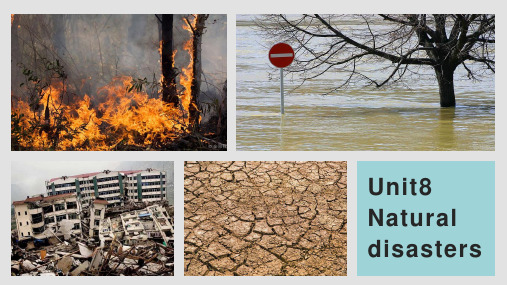
=hear of
hear from sb. 收到h1某.asp人tph来e.nh信av.p偶pe然ns发+时生间(或ha地pp点ened)
2.sth. happens to sb./sth. 某人/某
听说
物发生了某事(常指不好的事情)
一场电闪雷鸣的强暴风雨
着火(强调动作),过去时:caught; be on fire 着火(强调状态)。
Flood
What is a natural disaster ?
natural disaster 自然 灾害 /dɪˈzɑːstə / A natural disaster is an event with a natural, as opposed to human, cause that results in large-scale loss of life or damage to property.
猛撞,撞 /kræʃ/
A coach crashed into a house.
/kəutʃ/ 长途汽车;教练
/ˈæksɪdənt/ 事故
“Accidents” or “Disasters”?
The accidents are caused by_h_u_m__a_n_s___, while the natural disasters are caused by__n_at_u_r_e_.
3.Why doesn't Hobo want to go home alone?
Why doesn't Hobo want to go home alone?
Because he needs Eddie to mop up the water.
牛津译林版八年级上册Unit 8《Natural disasters》(Task)说课稿
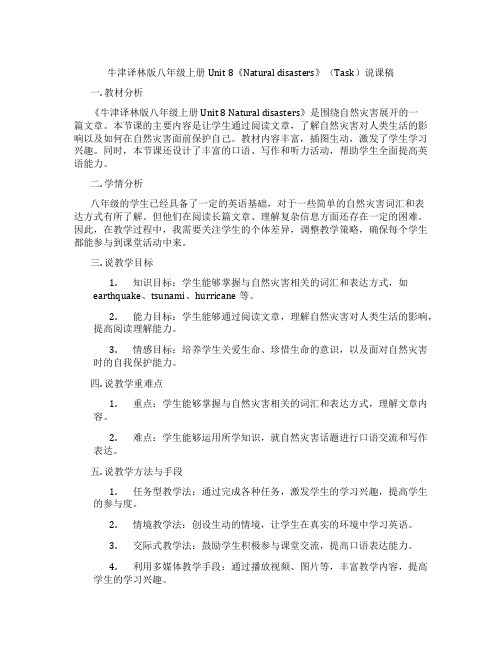
牛津译林版八年级上册Unit 8《Natural disasters》(Task)说课稿一. 教材分析《牛津译林版八年级上册Unit 8 Natural disasters》是围绕自然灾害展开的一篇文章。
本节课的主要内容是让学生通过阅读文章,了解自然灾害对人类生活的影响以及如何在自然灾害面前保护自己。
教材内容丰富,插图生动,激发了学生学习兴趣。
同时,本节课还设计了丰富的口语、写作和听力活动,帮助学生全面提高英语能力。
二. 学情分析八年级的学生已经具备了一定的英语基础,对于一些简单的自然灾害词汇和表达方式有所了解。
但他们在阅读长篇文章、理解复杂信息方面还存在一定的困难。
因此,在教学过程中,我需要关注学生的个体差异,调整教学策略,确保每个学生都能参与到课堂活动中来。
三. 说教学目标1.知识目标:学生能够掌握与自然灾害相关的词汇和表达方式,如earthquake、tsunami、hurricane等。
2.能力目标:学生能够通过阅读文章,理解自然灾害对人类生活的影响,提高阅读理解能力。
3.情感目标:培养学生关爱生命、珍惜生命的意识,以及面对自然灾害时的自我保护能力。
四. 说教学重难点1.重点:学生能够掌握与自然灾害相关的词汇和表达方式,理解文章内容。
2.难点:学生能够运用所学知识,就自然灾害话题进行口语交流和写作表达。
五. 说教学方法与手段1.任务型教学法:通过完成各种任务,激发学生的学习兴趣,提高学生的参与度。
2.情境教学法:创设生动的情境,让学生在真实的环境中学习英语。
3.交际式教学法:鼓励学生积极参与课堂交流,提高口语表达能力。
4.利用多媒体教学手段:通过播放视频、图片等,丰富教学内容,提高学生的学习兴趣。
六. 说教学过程1.导入:以一段关于自然灾害的视频导入,激发学生的学习兴趣。
2.阅读理解:学生阅读文章,回答相关问题,了解自然灾害对人类生活的影响。
3.词汇学习:学生通过小组合作,归纳总结文章中出现的自然灾害词汇。
牛津译林版八年级英语上册unit8naturaldisasterstask

今天早晨人们努力工作来除去(remove)路 上的积雪。
_T_h_is_m_o_rn_in_g_p_eo_p_le_w_e_re_w_o_r_ki_ng_h_a_rd___________ _to_r_e_m_ov_e_the snow.
我们的家乡真美啊! _H_o_w_b_e_au_t_ifu_l_ou_r_h_o_m_et_ow_n_i_s!_______________
after the snowstorm
Choose a topic(话题)
What to write about
Introduction(介绍)
During the disaster
After the dn and where
I saw… I heard… I felt… … I saw… I heard… …
After the snowstorm, many people were working hard to clear the snow.
Introduction Where did it happen? Beijing When did it happen? on Friday,5 January
走。 2. 天变得很黑,公路上发生了车祸。 3. 驾驶员的左腿严重受伤,幸运的是,有人打了110求救。 4. 警察把他送到医院,驾驶员变得好多了。 5. 遇到麻烦时,首先,我们必须冷静……
习作评价标准
分值
构思(2’) 内容(5’) 语言(4’)
其它(4’)
正确地叙事,时间顺序清楚。
结构合理、要点齐全、意思连贯。
Where were you? in the classroom
During the What did you do? share … with snowstorm What happened? lose my umbrella
牛津译林版八年级上Unit8NaturaldisastersGrammar教案

牛津译林版八年级上Unit8NaturaldisastersGrammar教案Module 2 Unit 8教案二Grammar教学目标l学会使用过去进行时。
2学会使用when、while和as教学准备关于Simon前一天所做事情的图片。
教学步骤A Past continuous tenseStep I导入1检查家庭作业,了解学生对Reading部分的熟读或背诵情况。
在基础较好的班级可以让学生背诵,在基础较弱的班级可以让学生朗读,教师根据情况纠正学生的读音。
2教师通过提问检查学生对于课文的理解情况。
(1) What was Timmy doing when the earthquake started? (He was sleeping.)(2) What were people doing while pieces of glass and bricks were falling down?(People were running in all directions.)(3) What was Timmy doing when he suddenly heard some noise above him?(He was trying to find his way out.)Step II呈现1教师呈现上述问题的答案,通过其他颜色或下划线突出显示句子中的过去进行时部分,让学生仔细体会这种新时态,引导学生总结出:过去进行时用于表达过去时间点或某个时间段正在进行的动作。
2教师讲解过去进行时的基本构成方法:was/were (not)+“verb-ing” form。
3教师呈现多幅关于Simon前一天所做事情的图片,每张图片中都有一个时钟显示当时的时问。
教师说:Here are some pictures about what Simon did yesterday. Look at the pictures and make sentences with the past continuous tense. 让学生根据图片用过去进行时造句,如;Simon was having breakfast at seven o’clock yesterday morning.4教师呈现每幅图片所对应的句子,然后让学生集体朗读。
牛津译林版英语八上 Unit 8 Natural disasters

8A Unit 8 Natural disastersPeriod3(ReadingⅡ)一、词组翻译1.像打雷的巨大噪声____2.惊恐地尖叫着3.足够的空间__ ____4.尽力向外跑_______5.玻璃和砖头碎片____6.倒下来__________7.寻找出路_ _ ___ 8.陷入困境___9.听到人们兴奋的喊叫__________________ 10.看到明亮的日光二、词汇运用1. There are all kinds of thoughts running through my_________(头脑)now.2. I was frightened, but I told myself to _______(冷静)down.3. _________(由于)you are now here.I will make Max show you around our work place.4. They dropped hundreds of__________(炸弹)on the city.5. Please hold on for a__________(片刻).My father is coming to answer you.6. Do not always keep_________(沉默的)in class,you should be more active.7. Liu Xing heard a _______(loudly) and strange noise.8. The _______(exciting) people all stood up and cheered for Lin Dan.三、单项选择( )1._______you don’t like the bike,you should not buy it.A.With B.But C.So D.Since( )2.Don’t make any_______.Your father is writing in the next room.A.noist B.voice C.sound D.shout( )3.I'm_________you should come here before eight o'clock tomorrow morning.A afraid B.happy C.worried D.excited( )4.At that time I didn’t even know_________.A.where am I B.I am where C.where was I D.where 1 was( )5.Some animals are able to______alive,________eating any food in winter.A.become;not B.turn;no C.stay;without D.keep:not( )6.Let’s_______ the big stone,or there may be a traffic accident。
牛津译林版八年级上册Unit 8《Natural disasters》(Task)教学设计

牛津译林版八年级上册Unit 8《Natural disasters》(Task)教学设计一. 教材分析牛津译林版八年级上册Unit 8《Natural disasters》主要介绍了自然灾害,包括地震、洪水、台风等,通过学习本单元,学生可以掌握有关自然灾害的词汇和表达方式,了解自然灾害发生的原因及应对措施。
Task部分要求学生阅读一篇关于自然灾害的文章,然后进行相关练习,培养学生的阅读能力和解决问题的能力。
二. 学情分析八年级的学生已经具备了一定的英语基础,能够进行简单的阅读和交流。
但部分学生在阅读长篇文章时,可能会遇到生词和语法难题,影响阅读理解。
此外,学生对于自然灾害的了解程度不一,需要教师在教学中进行引导和补充。
三. 教学目标1.知识目标:学生能够掌握有关自然灾害的词汇和表达方式,了解自然灾害发生的原因及应对措施。
2.能力目标:学生能够阅读并理解关于自然灾害的文章,提高阅读能力;通过任务型教学,培养学生的解决问题能力。
3.情感目标:培养学生关爱生命,关注自然的意识,提高学生应对自然灾害的能力。
四. 教学重难点1.重点:学生能够掌握有关自然灾害的词汇和表达方式,阅读并理解关于自然灾害的文章。
2.难点:学生能够运用所学知识,解决实际问题,提高应对自然灾害的能力。
五. 教学方法1.任务型教学法:通过任务型教学,让学生在实践中掌握知识,提高能力。
2.情境教学法:创设情境,让学生在真实的环境中学习,提高学生的学习兴趣。
3.合作学习法:引导学生进行小组合作,培养学生的团队精神和沟通能力。
六. 教学准备1.教师准备:提前准备关于自然灾害的文章,整理相关词汇和表达方式,设计任务型练习。
2.学生准备:预习课文,了解自然灾害的基本知识,准备参与课堂活动。
七. 教学过程1.导入(5分钟)教师通过提问方式引导学生谈论自然灾害,激发学生的学习兴趣。
例如:“你们知道哪些自然灾害?它们发生的原因是什么?”2.呈现(10分钟)教师呈现关于自然灾害的文章,让学生快速阅读,了解文章大意。
新牛津译林版八年级英语上册 Unit 8 Natural disasters

Unit 8 Reading【Analysis of teaching material】The Two reading paragraphs are excerpted from Robinson Crusoe which is written by Daniel Defoe and introduces Robinson’s youth and the time up to his shipwreck, his 28 years on an uninhabited island,his life and adventures after being rescued from the island.The first paragraph is about Robinson’s life and inner his feeling after he first arrived on the island, and the second paragraph mainly talks about the story between Robinson and Friday.【Teaching aims】1.Students master some key words and phrases.2.Students can improve their reading skills of scanning and skimming.3.Students can understand the present perfect tense in the passage4.Students can have awareness of never giving up in the face of difficulties.【Teaching key and difficult points】1.To improve students’ reading skills of skimming and scanning.2.To understand the present perfect tense in the passage.【Teaching method】3P【Teaching procedures】Step1: Lead-in1.Daily greeting to students.2.Check the homework3.Watch a short video and imagine what you will do if you are left alone on theisland? Wait for death or find ways to survive?4.What would you prepare to deal with the problems?Step2: Pre-readingLook at the picture, what can you know from the picture?Step3: Fast-readingRead and match the main idea with each paragraphStep 3: Careful reading1.Imagine what problems you may have if you were left alone on the island just like Robinson?2.Read para.1 and find what Robinson has done to deal with the problems?3.Read Para. 2 and complete the timelineStep 4: After reading1.What do you think of Robinson Crusoe?Robonsin is brave, creative, clever, optimistic and he is a ma full of wisdom and courage.2.What can we learn from Robinson Crusoe?●Never give up trying in the face of difficulties.●There are more ways than difficulties.●Learn the importance of life skillsLife is fine, and learn to enjoy it.3.Is there anyone who has the same spirit as Robinson?4.Robinson and Friday lived on the island for 28 years. Finally, they were saved by a ship passing by. Can you make up your end to the story?【Homework】Level 1:Tell the story of Robinson Crusoe to your friends after class.Level 2: Try to go on writing your own story of Robinson and share your story with us next class.【Blackboard design 】【Teaching reflection】In this reading class,individual learning and group cooperation are combined to promote to improve students’ reading skills, and in some ways stimulate learning motivation of students. However, as the reading passages in grade 8 are becoming more and more difficult,some students still don’t have the habit of previewing, so they can’t finish the reading tasks within limited time. Besides, some students are not able to understand the present perfect tense in the passage. Last but not least, the text analysis is not enough.。
牛津译林版-英语-八上-8单元 Natural disasters vocabulary
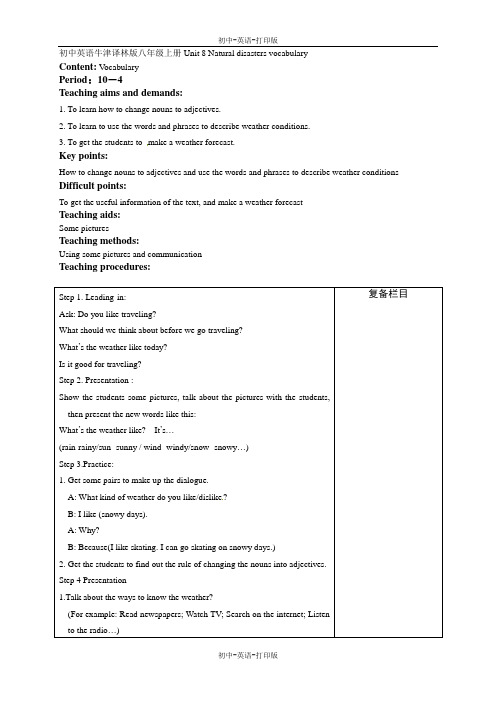
初中英语牛津译林版八年级上册Unit 8 Natural disasters vocabularyContent:V ocabularyPeriod:10-4Teaching aims and demands:1. To learn how to change nouns to adjectives.2. To learn to use the words and phrases to describe weather conditions.3. To get the students to make a weather forecast.Key points:How to change nouns to adjectives and use the words and phrases to describe weather conditions Difficult points:To get the useful information of the text, and make a weather forecastTeaching aids:Some picturesTeaching methods:Using some pictures and communicationTeaching procedures:复备栏目Step 1. Leading-in:Ask: Do you like traveling?What should we think about before we go traveling?What’s the weather like today?Is it good for traveling?Step 2. Presentation :Show the students some pictures, talk about the pictures with the students,then present the new words like this:What’s the weather like? It’s…(rain-rainy/sun -sunny / wind- windy/snow- snowy…)Step 3.Practice:1. Get some pairs to make up the dialogue.A: What kind of weather do you like/dislike?B: I like (snowy days).A: Why?B: Because(I like skating. I can go skating on snowy days.)2. Get the students to find out the rule of changing the nouns into adjectives.Step 4 Presentation1.Talk about the ways to know the weather?(For example: Read newspapers; Watch TV; Search on the internet; Listento the radio…)2. Look at the weather map and talk about the weather in China and teach thenew words at the same time(temperature, drop, lower).Here is a weather forecast on the internet. What’s the weather like in Beijing? What will the weather be like tomorrow/the day after tomorrow?Step 5. Practice:1. Finish the dialogue in the book and check the answers.2. Look at the map and make a weather forecast(Hello, everyone! Here is the weather forecast. Beijing will be …The temperature will…Thank you for listening.)3. Get the students to do the exercises on the paper.(见达标检测)Step 6 .Homework:1. Find the information about the weather in your hometown.2. Make a poster about the weather.3. Preview the con tents in Grammar A to know something about the past continuous tense.教学反思:达标检测Unit 6 V ocabulary (40’)一、按要求写出单词(10’)1.sun(形容词)__________________ 6.dry(比较级) __________________2.wind(形容词) __________________ 7.healthy(最高级) __________________3.cloud(形容词) __________________ 8.bad(比较级) __________________4.rain(形容词) __________________ 9.about(同义词) __________________5.fog(形容词) __________________ 10.terrible(比较级) __________________二用所给词的适当形式填空。
牛津译林版八年级英语上册 Unit 8 Natural disasters Integrated s

这是学生练习听力的一个
通过对话训练及表演,培养学生课堂情境对话能力。
重要环节,同时要了解紧急
求助电话所需交代的内容。学会以后遇到此类事情如何求助。在听力前适当对学生进行听力技巧指导很有必要,即Listening tips,如遇到长的词组及句子表达时,提倡用缩写,如three forty-five可以速记成3:45;Starlight Street, Sunshine Town速记成SSST等。
Step9. Homework &
consolidation
Read and remember
Discuss and write(whiteboard)
Watch and discuss.
Write the number
Listen and answer.
Practice and act.
Listen and write.
Step 2. Revision
Watch a video and review some natural disasters the students are familiar with.
Step 3.Write the correct telephone number under each picture Part A1
情感目标:学生通过学习本课知道以后怎样合理面对常见自然灾难,即学会怎样自救和他救,
同时也能提高安全意识。
教学重点:
1.学生听说读写综合技能的培养。
2.在自己遇到事故灾难时如何应对。
3.讨论如何预防和避免意外事故。
牛津译林版八年级英语上册专题+Unit8+Natural+disasters-讲义
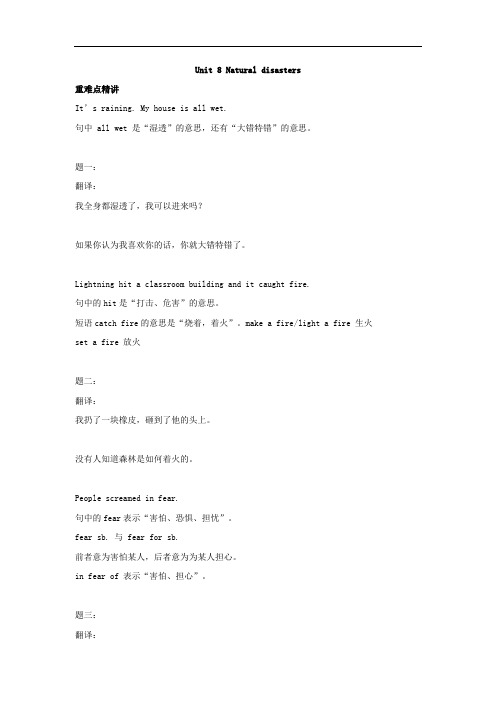
Unit 8 Natural disasters重难点精讲It’s raining. My house is all wet.句中 all wet 是“湿透”的意思,还有“大错特错”的意思。
题一:翻译:我全身都湿透了,我可以进来吗?如果你认为我喜欢你的话,你就大错特错了。
Lightning hit a classroom building and it caught fire.句中的hit是“打击、危害”的意思。
短语catch fire的意思是“烧着,着火”。
make a fire/light a fire 生火set a fire 放火题二:翻译:我扔了一块橡皮,砸到了他的头上。
没有人知道森林是如何着火的。
People screamed in fear.句中的fear表示“害怕、恐惧、担忧”。
fear sb. 与 fear for sb.前者意为害怕某人,后者意为为某人担心。
in fear of 表示“害怕、担心”。
题三:翻译:他怕他老婆。
他为他老婆担心。
我们担心会再下雪。
Outside, people were running in all directions while pieces of glass and bricks were falling down.句中的while是一个连词,连接两个并列句,表示“对比”关系。
in all directions 四面八方题四:翻译:我喜欢唱歌,而她喜欢跳舞。
他出去散步了,而我却呆在家里。
学生们从四面八方地跑进了教室。
A moment of fear went through my mind, but I told myself to calm down since I was still alive.句中的fear是______,是“______”的意思。
go through有“通过、检查”的意思。
calm down, relax, cool down题五:翻译:你现在害怕回到你自己的国家吗?他正处于非常艰难的时期。
牛津译林版八年级英语上册《nit 8 Natural disasters Task: A natural disaster》优质课课件_12

A story of a fire
the beginning
during
after
How did you feel?
they _w__a_lk_e_d_t_h_r_o_u_g_h_t_h_e_f_lo_o_d__w_a_t_e_r_.
Away from danger
fires
floods
earthquakes
Traffic accidents
*Call 119. *Try to get out. *Cover your mouth and nose with a wet towel. *Stay low to the ground. *Never go back into the building.
I w__a_s_re_a_d_i_ng__a_b_o_o_k_with my parents at seven in the evening.
I _w_a_s__h_av_i_n_g_d_in_n_e_r_ when I heard someone shouting “Fire! Fire! ”
We_w_e_re__s_ta_y_in_g_a_t_h_o_m__e the whole afternoon. I was watching films while Simon _w__as__lis_t_e_n_in_g_t_o_m__u_si_c.
What were you doing when the fire started?
- 1、下载文档前请自行甄别文档内容的完整性,平台不提供额外的编辑、内容补充、找答案等附加服务。
- 2、"仅部分预览"的文档,不可在线预览部分如存在完整性等问题,可反馈申请退款(可完整预览的文档不适用该条件!)。
- 3、如文档侵犯您的权益,请联系客服反馈,我们会尽快为您处理(人工客服工作时间:9:00-18:30)。
Unit 8 Natural disastersComic strip and welcome to the unitTeaching Aims:1. To learn the new words and phrases2. To meet the past continuous tense3. Talk about s ome natural disaster.Step 1 Presentation1. Show some pictures to learn some words.2. Then read aloud the new words.disaster mop up earthquake thousands of accident coach crash flood wash away village lightning storm thunder catch fire Step 2 Do some exercises.Do Part A on page 93.Check the answers.Step 3 PresentationShow some pictures to present comic strip.Step 4 Listen and answer1. Listen to the tape and answer the follow questions.1) What’s the weather like?2) What happened to Hobo?3) What was Hobo doing when it started to rain?4) Did Hobo hear the rain?5) Why doesn’t he want to go home alone?6) What do you think of Hobo?2. Read the dialogue in pairs.3. Act it out.Step 6 Listening1. Listen to part B and answer the following question.1) What happened to Vivien’s school?2) When did it happen?2. Read after the recorder.3. Pratice in pairs.4. Act it out.5. Make their own dialogue.Step 7 Explanation1. wake up 醒过wake sb. up 叫醒某人e.g. I wake up at six every morning!我每天早上六点钟醒来。
She wakes me up at six every morning.她每天早上六点钟叫醒我。
2. mop up 拖干净,把......拖干净e.g. Hobo wants Eddie to mop up the water.Hobo想要Eddie把水拖干净。
3. thousands of 成千上万的e.g. There are thousands of people on the road.路上有成千上万的人。
4. a car accident 一场车祸e.g. There was a car accident yesterday.昨天有一场车祸。
5. crash into 猛撞,碰撞e.g. A car crashed into a tree last night.昨天晚上一辆车猛撞到一棵树上。
6. wash away 冲走e.g. A terrible flood washed away his house.一场可怕的洪水冲走了他的房子。
7. fall from 从……掉下,落下e.g. The boy fell from a tree and hurt his legs.那个男孩从树上掉下来伤到了他的腿。
8. catch fire 着火e.g. The house caught fire because of the lightening. 因为闪电那个房子着火了。
Step 8 Exercises根据汉语提示或所给词的正确形式填空:1. There are many _________ (灾害) in the world every day.2. I heard of a car _________ (事故) here.3. --- What was the weather like yesterday?--- It was_________ (sun) but ________ (wind).4. Our school football team _______ (lose) the game last Friday.5. My brother __________ (fall) off his bike just now.6. I __________ (do) my homework when my mother came back.翻译下列句子:1. 下周天气将会变得更糟。
The weather _________________ next week.2. 数千人在一次地震中丧生了。
____________ people _____________ in the earthquake.3. 一场洪水冲走了他们的房子。
A flood ________________________.Step 9 Homework1. Read the text book and learn the new words and phrases by heart.2. Do the exercises in the workbook.Reading IIAims:1. Learn the language points in this article.2. Learn to talk about natural disasters.Step 1 RevisionHow much do you know about ‘An earthquake’?Fill in the table.Step 2 Explanation1. feel a slight shake (n.)感到一阵轻微的震动e.g. We felt a slight shake when the earthquake started.当地震开始的时候我们感到一阵轻微的震动。
2. start to shake (vt.) 开始摇动e.g. The earth started to shake when the earthquake began.当地震开始时地球开始摇动。
3. in fear 害怕地,恐惧地相似的结构还有:in trouble 有麻烦的in need 需要帮助的in danger 处于危险之中in hunger 饥饿的e.g. People screamed in fear.人们害怕地尖叫起来。
e.g. They got lost in the forest. They had to try different ways i n fear.他们在森林里迷路了,他们不得不害怕地尝试不同的路。
4. run out of …从……跑出e.g. Some students run out o f the classroom.一些学生从教室里跑出来。
5. run in all directions 跑向四面八方e.g. People ran in all directions.人们跑向四面八方。
6. come down 崩塌,坍塌e.g. The walls began to come down.墙开始坍塌了。
7. feel nervous 感到紧张8. beat fast 跳的快e.g. He felt nervous and his heart was beating fast.他感到紧张并且他的心跳的很快。
9. calm down 冷静下来,平静下来calm v.使平静,使镇静n.平静,宁静adj. 平静的,镇静的e.g. I’m nervous, but I told myself to calm down.我很紧张,但是我告诉自己要平静下来。
e.g. I must keep calm.我必须要保持冷静。
10. find one’s way out 找到出路e.g. He wants to find his way out.他想要找到出路。
11. move away 搬走,移走e.g. They quickly move away the bricks.他们快速的搬走了砖块。
Step 3 Do some exercises一、根据句意和首字母提示补全单词,使句子完整、通顺。
1. The two old friends s_____ hands hard when they met in the street.2. Most buildings in this area are made of b________ and stones.3. The girl was f ull of f_____ when the earthquake started.4. I tried to c______ down, but I was still frightened.5. Kate began to s_____ when she saw a worm in her book.二、Find the following phrases from the text.起初惊恐地在地下向四处跑玻璃的碎片和砖块开始倒塌冷静下来三、Fill in the blanks.1. Frightened by the loud noise, the children looked at each other ________ (害怕地).2. The small animals in the forest __________________ (四处逃窜) when they saw a tiger coming.3. We _________________ (正在尽全力) to protect wild animals.4. The fans _______________(疯狂尖叫) all the time during the concert.5. I _____________ (平静下来) after listening to the beautiful music.6. Five workers ____________ (被困) in the mine for 10 hours last month.四、Translation1. 地震开始的时候,她正在购物。
